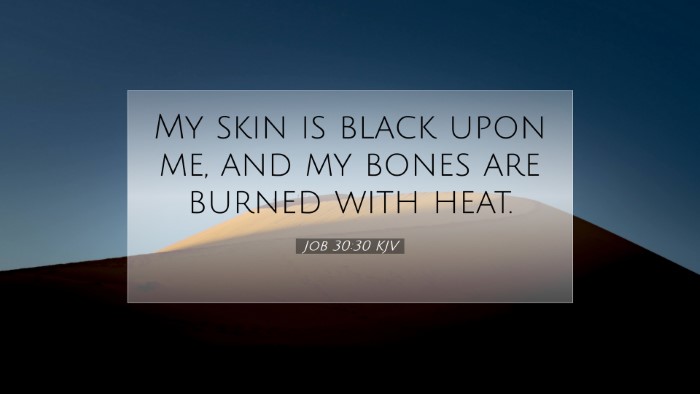Commentary on Job 30:30
Verse: "My skin is black upon me, and my bones are burned with heat."
Contextual Overview
The book of Job presents one of the most profound treatments of human suffering and divine justice in Scripture. In this chapter, Job laments his dire situation and the marked change in his condition from prosperity to desolation. His painful descriptions convey not only physical suffering but also emotional and social pain.
Exegesis of Job 30:30
Job expresses a deep, physical anguish in this verse, using vivid imagery. The phrase "my skin is black upon me" indicates a change and degradation in his appearance, possibly a reference to extreme suffering that has affected his physical well-being. It could signify a variety of things, including malnutrition, illness, or the effects of intense grief.
Furthermore, "my bones are burned with heat" speaks to the intensity of his pain; it reflects a feverish state or an inner turmoil that consumes him. The dual imagery suggests that Job's suffering is not merely superficial but deeply rooted within his very being.
Insights from Commentators
-
Matthew Henry:
Henry interprets Job's words as an expression of complete abandonment by God and humanity. He notes that Job’s physical state mirrors his spiritual desolation, emphasizing the holistic nature of human suffering. Henry articulates that Job feels forsaken, having once experienced the blessings of God but now finds himself afflicted and alone.
-
Albert Barnes:
Barnes points out the significance of Job’s complaint regarding his skin and bones, suggesting that the physical manifestations correspond to the inner agony he endures. He explains that the term "burned" illustrates the severity of Job’s suffering, affirming that Job’s lament resonates with both those who have experienced suffering and those who look to understand the depths of human distress.
-
Adam Clarke:
Clarke elaborates on the implications of Job's statements, suggesting that the imagery of blackness represents despair and mourning rather than mere physical ailment. He connects Job’s description to the cultural views of the time, where physical appearances often represented one's spiritual standing. Thus, Job's lament becomes a reflection of the societal view of affliction correlating with divine punishment.
Theological Implications
The theological implications of Job 30:30 are extensive. This verse highlights the reality of suffering in the believer's life. Job's experience challenges the perception that righteousness should guarantee blessing and prosperity. Instead, it underscores the mystery of God's sovereignty and the varied experiences of faithfulness amidst trial.
Moreover, the intensity of Job’s expressions invites deeper discussions about the human condition, the nature of suffering, and God’s presence in the midst of pain. The faithful believer may feel God's absence during trials, yet the testimony of Scripture reveals that such moments, albeit difficult, can lead to profound insights into both God’s character and the believer's dependence on Him.
Practical Applications
For pastoral care, Job 30:30 serves as a reminder of the importance of empathy towards the suffering. It urges the church to create a space where individuals can express their grief and pain without fear of judgment. Pastors and theologians can draw from Job's raw honesty to guide others through their sorrow, affirming that it is not outward piety but inner reality that God values.
Students and scholars can engage with this text to explore themes of suffering, lament, and divine presence. By studying the nuances of Job's lament, they can contribute to the larger discourse on theodicy—the justification of God’s goodness in light of the existence of evil and suffering.
Conclusion
Job 30:30 is a poignant expression of anguish that speaks both to the individual experience of suffering and the communal responsibilities of those who bear witness to it. The insights drawn from the writings of prominent commentators enrich our understanding of this text and its application to contemporary faith. As we ponder Job's lament, may we cultivate a deeper empathy and a more profound faith in the God who sees us in our deepest pain.


